

It's been described as one of the 'most complex games ever devised by man' and has trillions of possible moves, but even the ancient game of Go is no match for machines.
An algorithm called AlphaGo has beaten one of the 3,000-year-old game's best players called Fan Hui in a recent tournament set up by Google.
The game, which was first played in China and is far harder than chess, had been regarded as an outstanding 'grand challenge' for Artificial Intelligence - until now.
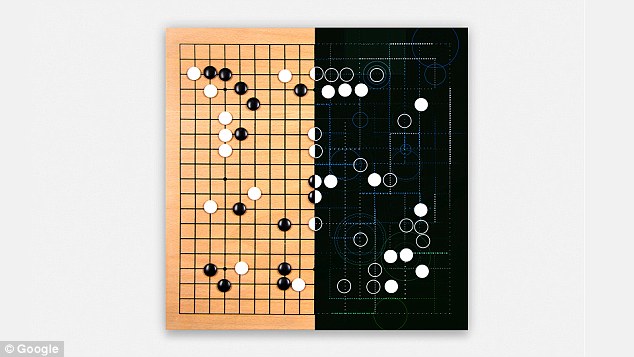
A computer programme has beaten one of the best players at what's described as 'the most complex game ever devised by man'. An illustration showing a half a traditional Go board and half showing computer-calculated moves is pictured above.
The result of the tournament, which the machine won 5-0, provides hope robots could perform as well as humans in areas of as complex as disease analysis, but it may worry some who fear we may be outsmarted by the machines we create.
The computer is now set to take on the world's best Go player with a cool $1 million (£701,607) prize pot up for grabs.
If the computer wins, its developer Demis Hassabis, boss of Google-owned DeepMind said it will donate the winnings to charity.
In the game, two players take turns to place black or white stones on a square grid, with the goal being to dominate the board by surrounding the opponent's pieces.
Once placed, the stones can't be moved unless they are surrounded and captured by the other person's pieces.
It's been estimated there are 10 to the power of 700 possible ways a Go game can be played - more than the number of atoms in the universe.
By contrast, chess - a game at which Artificial Intelligence (AI) can already play at grandmaster level and famously defeated world champion Gary Kasparov 20 years ago - has about 10 to the power of 60 possible scenarios.
Until now, the most successful computer Go programmes have played at the level of human amateurs and have not been able to defeat a professional player.
But the champion program called AlphaGo, uses 'value networks' to evaluate board positions and 'policy networks' to select moves.
The 'deep neural' networks are trained through a combination of 'supervised learning' from human expert games and 'reinforcement learning' from games it plays against itself.
AlphaGo was developed by Google's DeepMind and signifies a major step forward in one of the great challenges in the development of AI - that of game-playing.
The computer achieved a 99.8 per cent winning rate against other Go programmes and defeated the three-times European Go champion and Chinese professional Fan Hui in a tournament by a clean sweep of five games to nil.
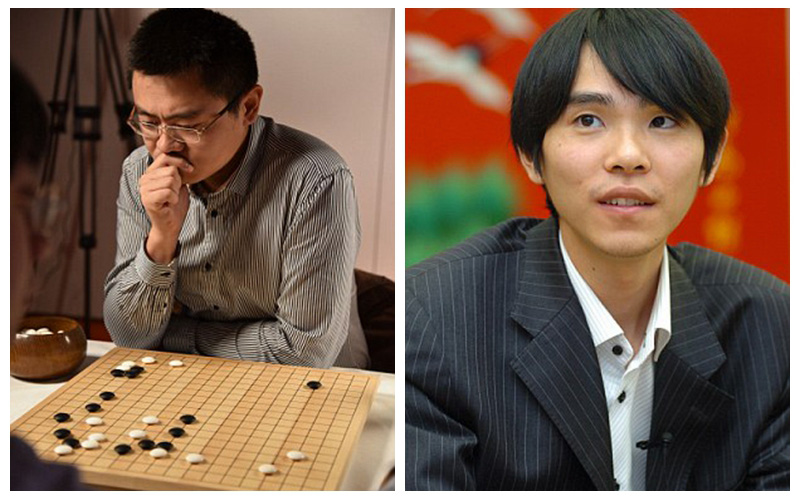
Now the machine has beaten Fan Hui (pictured left) it will face the top human player - Lee Sedol (right) of South Korea – at a meeting in Seoul in March, with the winner to be awarded $1 million (£701,607)
Toby Manning, treasurer of the British Go Association who was the referee, said: 'The games were played under full tournament conditions and there was no disadvantage to Fan Hui in playing a machine not a man.
'Google DeepMind are to be congratulated in developing this impressive piece of software.'
This is the first time a computer programme has defeated a professional player in the full-sized game of Go with no handicap.
This feat was believed to be a decade away.
The computer will take on the top human player - Lee Sedol, of South Korea – at a meeting in Seoul in March, with the inner to be awarded $1 milion.
Mr Sedol said: 'I have heard that Google DeepMind's AI is surprisingly strong and getting stronger, but I am confident that I can win at least this time.'
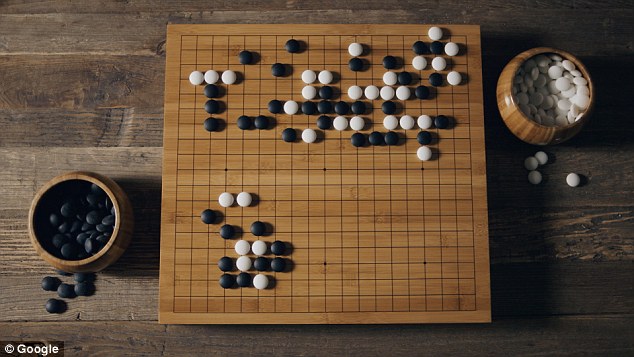
In the game, two players take turns to place black or white stones on a square grid, with the goal being to dominate the board by surrounding the opponent's pieces.
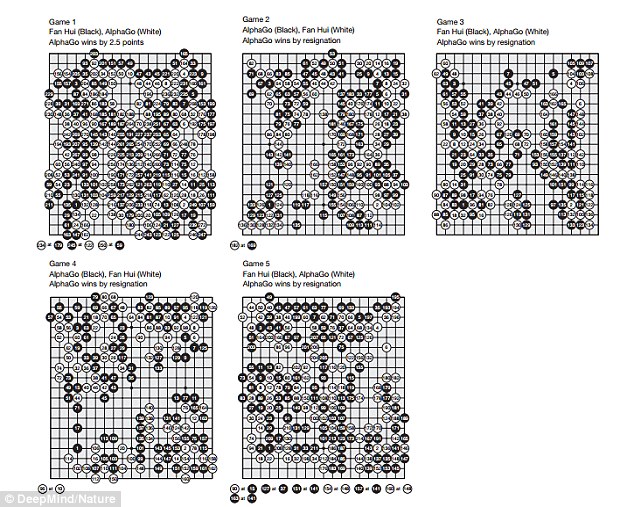
The program took on reigning three-time European Go champion Fan Hui at Google's London office. In a closed-doors match last October, AlphaGo won by five games to zero (the end positions are shown)
President of the British Go Association Jon Diamond said: 'Following the Chess match between Gary Kasparov and IBM's Deep Blue in 1996 the goal of some Artificial Intelligence researchers to beat the top human Go players was an outstanding challenge - perhaps the most difficult one in the realm of games.
'It's always been acknowledged the higher branching factor in Go compared to Chess and the higher number of moves in a game made programming Go an order of magnitude more difficult.
'On reviewing the games against Fan Hui I was very impressed by AlphaGo's strength and actually found it difficult to decide which side was the computer, when I had no prior knowledge.
'Before this match the best computer programs were not as good as the top amateur players and I was still expecting that it would be at least five to 10 years before a program would be able to beat the top human players.
Day|Week

 Beautiful Chinese tennis player Wang Qiang goes viral online
Beautiful Chinese tennis player Wang Qiang goes viral online Chinese pole dancing master opens class in Tianjin
Chinese pole dancing master opens class in Tianjin The most beautiful town of snow in China
The most beautiful town of snow in China SWAT members hold romantic wedding in E China
SWAT members hold romantic wedding in E China Breathtaking scenery and simple lifestyle in Hainan
Breathtaking scenery and simple lifestyle in Hainan Finding sexiest underwear supermodels
Finding sexiest underwear supermodels Top 10 ancient pagodas in China
Top 10 ancient pagodas in China Chinese version of Victoria's Secret Show held in Hunan
Chinese version of Victoria's Secret Show held in Hunan Can you find out the sniper hiding in camouflage?
Can you find out the sniper hiding in camouflage?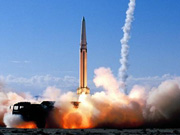 Spectacular rockets launch scenes
Spectacular rockets launch scenes